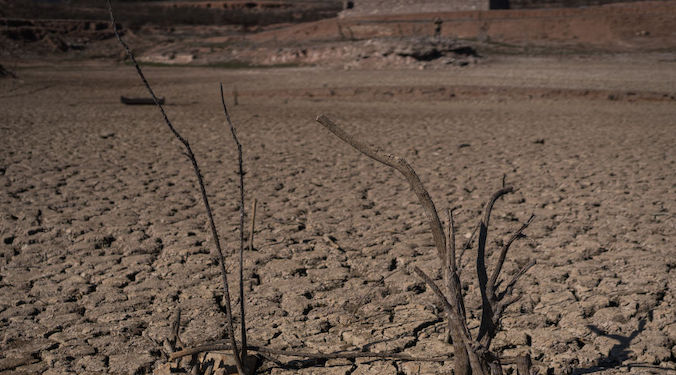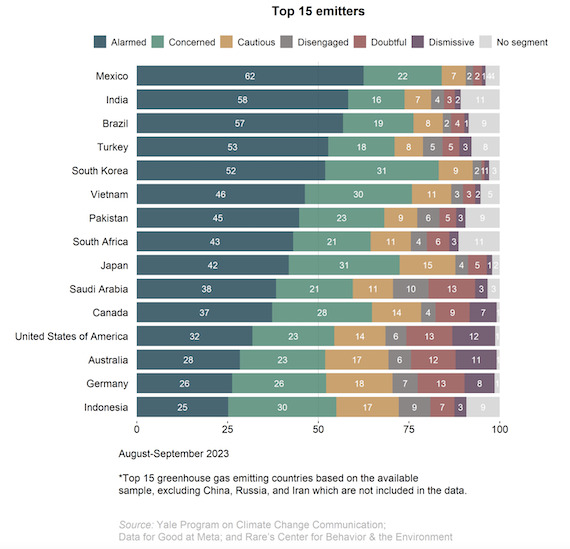What Would It Take to ‘Alarm’ Americans About Climate Change?
Photo by Adri Salido/Getty Images
How would you describe your resting climate change mindset? As the heat waves continue to scorch the country, early-season hurricanes leave swathes of flooding and destruction behind them, and wildfires start to chew up the West, are you alarmed? Concerned? Cautious?
Those are three of the options identified by some long-standing research from the Yale Program on Climate Change Communication, which divides the populace of both this country and the world into those and three other possible attitudes — disengaged, doubtful, and dismissive. The definitions here are fairly straightforward; how worried are you and how much do you think we should be doing about it, from “much, much more” to “stop doing anything, it’s not real.”
- Bernie Sanders and Some Democrats Get Ready to Lick Elon’s Boots and Practice the Politics of the Past
- Nancy Mace Is an Irredeemable Garbage Person Who Loves Bullying Vulnerable People and Yet the Media Still Believes Her
- NBC Seems to Suggest a Children's Video Game is to Blame for UnitedHealthcare CEO's Killing
In its latest analysis out Tuesday, the U.S. fares… poorly.
Among the world’s top 15 emitting countries (notably omitting China, Russia, and Iran, for lack of data), this country ranks 11th in the percentage of “alarmed” respondents at 32 percent, ahead of only Australia, Germany, and Indonesia. Adding in the “concerned,” or those who support climate policy but sorta less so than alarmed people, we manage 55 percent in total, tied with Indonesia and just ahead of those other two laggards.
And notably, we have the highest proportion of “doubtful” and “dismissive” people, at 25 percent. USA! USA!

That 32 percent number for the alarmed of America is remarkable, given the sheer number of people who have been facing down the most extreme heat of their lives in recent years, not to mention the increased flooding and wildfire and so on. And the alarm has percolated through plenty of other places, including those high emitters; Mexico leads the way, at 62 percent alarmed and another 22 percent concerned — which might explain why that country just elected a climate scientist to its presidency. Attitudes in other places including India and Brazil are similar.
One dividing line between the alarmed and the complacent is between low and high per-capita income and emissions — in general the poorer places are more concerned about what the rich places are doing to them, and the rich places are maybe a bit too sure of their ability to adapt. In low per-capita income/emissions countries, 45 percent are alarmed, while only eight percent are doubtful or dismissive; in high income/emissions countries, only 33 percent are alarmed, and 15 percent doubt we should do much at all about it.
The rich-poor divide helps explain some baffling numbers seen based on vulnerability. The Netherlands is among the seven or eight most low-lying nations in the world, including various Pacific island states; and yet it ranks dead last among countries studied in terms of its alarmed citizens, at only nine percent. Perhaps its centuries of experience holding back the floods cuts through some of the concern?
Other vulnerable countries seem to match a bit more closely with their reality. Bangladesh and its tens of millions at or below sea level has some of the more worried citizens in the Asia/Pacific region; Portugal and Greece, both of which have suffered through catastrophic wildfire seasons recently, top Europe’s list; and Puerto Rico, assessed separately from the US, has a whopping 70 percent of alarmed citizens and another 18 percent concerned. Periodic direct hits from warming-juiced hurricanes might be a culprit here.
Some minor glimmers of hope here in the US: the percentage of alarmed people is rising slightly, up from 28 percent in the most recent America-only version of this report (though there may be the usual timing issues with this polling). Of course, the number of concerned people fell from 29 percent to 23 percent, and both doubtful and dismissive saw small upticks, so maybe this is sort of a wash.
In any case, the world’s second-biggest emitter and far-and-away biggest historical emitter, clearly has more of a reality problem than most everywhere else; how many times can we all get punched in the face before even admitting we’re in a boxing match?